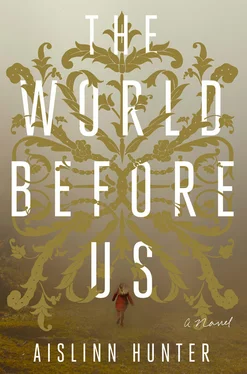No two people saw the August 1st event in the dining hall the same way. Hopper refused to be complicit, and so Alfred Hale enlisted Herschel, who, having finished his bowl of rabbit stew, waved at Eliza across the oak divider until he had her full attention. When the patients were all getting up to leave, she crossed the room toward the waist-high partition and Herschel and Hale approached her. Hale was hiding the knife he’d prised the evening before from the rump of ham sitting inside the kitchen on a sideboard.
Greevy would say later that it was Herschel who had ruined the promise of the walking party. That had he and Leeson not gone off into the woods the morning after the event in the dining hall, the rights and privileges promised the patients, and the expedition to the gardens at Inglewood, would have been ensured. But in truth it was Hale who ruined things — who brought the knife to Eliza’s throat after she crossed the divide to greet him.
What was lost that month was not only the promise of a walking party and the sight of exotic gardens whose plants had been transported from countries that sounded lush and mountain-crowned, but also an element of trust amongst the patients. Any sense they had of independence was gone, for suddenly in the wake of the various crises, it became clear that the actions of one impacted the others without any gaps or omissions. Hale had brought the blade up, Leeson had moved to intervene, and Herschel had cluck ed in excitement and drawn Bream’s attention.
Eliza had watched them all assemble, peering down at the heavy bone handle of the knife at her throat, laughing as if she’d been enlisted in a pantomime. Bream barely had his hands on Hale when Eliza wrested herself from the musician’s grip, turning to kiss her assailant on the cheek. He was bundled off with his hands behind his back and not seen by any of the other patients for a week.
In the aftermath of the attack Herschel was chastised and censured. Superintendent Thorpe retracted a number of privileges, reading them off a list as Herschel sat in the doctor’s damp office with his mouth open. “No garden plot for you,” Thorpe said, “and no walking party. And no escorted rambles in the bloody woods.” The sound of the pencil whisking across the paper, striking off one form of contentment after another, was almost more than Herschel could bear. “You may have drawn Bream’s attention,” Thorpe snapped, “but I have witnesses that saw you lure her over.” He leaned forward in his chair and Herschel flinched. “She could have been killed, you know.”
It was the woods that had made the confinement during the weeks of rain bearable for Herschel. If he stood under the lip of the hospital roof in the airing court he could still see the trees bristling wetly beyond the stone walls, hear the proo-proo and brrrk of the birds in their shelters. A desire rose in him to see the birds and confirm that they were real; also a desire to make himself known to them, to consolidate some sense of community. A week before the rain started Herschel had been given spadework in the potato beds, only to be reassigned to art class when Bream found him at dinner tending to a shirt-pocket full of worms. In art class the patients were encouraged to suggest assignments: paint a tree, attempt a portrait, replicate an aspect of hospital architecture. When it was the poet’s turn he said that everyone had to paint an image caught in the eye of an animal. He requested it in verse and then bowed deeply at Herschel. During the day in the woods with Leeson and the girl, Herschel was still seething at the rights and privileges Thorpe had taken away, but he was also looking for that stillness: a dunnock or a resting tit, a crow on a low branch who might cast back his likeness.
At first Herschel had been unhappy when Leeson joined him in the woods, had watched with dismay as he came briskly through a clearing and flailed a hand overhead. The two men were friends because of the nature of their circumstances and the proximity of their ward beds, but, Herschel felt, Leeson did not understand him. By the time the girl joined them, he had reconciled himself to the fact of company, though it was the poet he would have preferred to be with.
As Charles and the girl walked ahead, Herschel busied himself tracking the patter of the birds as they took to their shrubs and branches, their own poems arcing out of the flutes of their throats. Theirs was a language he could speak, their twittering complaints and warbled praise braided with his own twiney thinking. Herschel understood that he did not see the world as others saw it. He saw himself as being like the poet in this regard, although the poet had a means to speak of his purgatorial travels whereas Herschel did not. In the weeks before the walk his problem had been getting worse. He would recover his voice in therapy only to lose it again, and because of this he had started to pluck grievances from grounds where there were none, to revel in bitterness. He could savour the weight of his silence only when he was amongst the others, and so he started to take the most prominent seat in the games room or in the ward in order to perch there, his face slack and his mouth gaping open like a purse.
We know that when Jane read Herschel’s casebook she was able to see how his progress varied. One week there would be talk of his release, and the next there would be a threat of removal to one of the stricter asylums. He oscillated from improving to having fits to privileges returned within three hastily written lines. What Jane doesn’t understand is that this is only part of the story, gleaned as the hospital staff tracked patients over the course of a day or two and jotted down exaggerated acts or volatile aspects. The hours of selfhood between fits in the bath or dining hall rebellions went mostly unrecorded, and no one but Dr. Thorpe was tasked with asking “How do you feel?” or “What are you thinking?” No one but Thorpe was willing to read Herschel’s body language, watch him flit his hands and arms as if they could speak for him on the days his voice failed.
The lack of a proper voice, the silence, wasn’t Herschel’s choice. A trap door had closed in his throat one morning and refused to open again. He’d been walking the cornfields of his farm, watching the crows settle between the stalks. He had opened his mouth, intending to disperse them, but instead of a human word a serrated sound came out. He squawked at himself with surprise. That night under the rough blankets of his bed he could feel a tingling in one arm; then, days later, he felt a prickliness in the other. The soles of his feet became itchy and his clothes nettled his skin. His body grew strange and worked against him — his arms so heavy that although he became fascinated with the contours of his own limp sex he stopped being able to touch it. He walked purposefully into town but when the chemist asked him to describe what salve he sought, a guttural sound emerged. When he tried to modify it, it assumed the whoot of an owl. At first he recoiled from his disability, hid in out-of-the-way places when his woman came around — on the sloped roof of his barn, on the guttered lip of his neighbour’s house. But then he realized what was happening: it wasn’t that he couldn’t speak; rather, he was acquiring a new language, and his physical discomfort was part of the required change. Some days, if he concentrated, he believed he could feel his metamorphosis — his vocal fold closing and his esophagus opening into a swelling crop, the crop opening onto a blooming gizzard.
It suited Herschel that the physician called to the farm to assess him believed he was an imbecile.
When asked by the young doctor if he was a danger to others, the woman who claimed she was Herschel’s wife — but who did not, in reality, live with him — gazed at Herschel with hooded lids and said, “Yes.” She sat primly in the front room when the second doctor came and testified that she lived in constant fear of her husband’s self-harm, pointing to the grey space of the adjacent kitchen where she said duty had required her to lock up the knives. Herschel caw ed in reply. He knew there would be some other man in his bed before he exited the carriage at the hospital. Still, even in his fledgling state, Herschel knew that, no matter the cost, he wanted other than what he had. He was tired of meagreness and petty ways of thinking; he wanted a larger view of the world, wanted to get out of the poverty of his own life, out of the insularity of the village he had been brought up in. The second doctor, at least, had studied him with a certain degree of open-minded patience, as if he discerned a mind at work under Herschel’s feathered thinking.
Читать дальше












